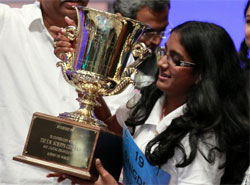
Washington, June 1: Snigdha Nandipati, a 14-year-old Indian American girl, correctly spelled ''guetapens'', French for ambush, to win the 2012 Scripps National Spelling Bee crown and retain the coveted honour for the community for the fifth year in a row.
"It's a miracle," said Nandipati from San Diego, California, as she pipped fellow Indian American Stuti Mishra, 14, of West Melbourne, Florida who stumbled over "schwarmerei", German for extravagant enthusiasm, in the last round of the final at a convention centre outside Washington Thursday night.
Nandipati, an avid reader and coin collector who aspires to become a psychiatrist or neurosurgeon, gets $30,000 in cash, a trophy, a $2,500 savings bond, a $5,000 scholarship, $2,600 in reference works from the Encyclopedia Britannica and an online language course.
Nandipati plays violin and is fluent in Telugu. She is the fifth consecutive Indian-American winner and 10th in the last 14 years.
The Indian-American community's victory run began in 1999 when Nupur Lala captured the crown and was later featured in the documentary "Spellbound".
Anamika Veeramani scored a hat-trick for Indian-Americans by taking the crown in 2010.
With Arvind Mahankali, 12, of Bayside Hills, New York, a finalist for the last two years, the three Indian American kids were the top spellers left in the last round from among the nine who made the finals Thursday.
Forty-one spellers, meanwhile, heard the dreaded bell that signals an incorrect spelling in the semi-finals. Those included one of the favorites, 10-year-old Vanya Shivashankar of Olathe, Kansas. The younger sister of the 2009 champion got the only perfect score in the preliminary rounds.
Breezily confident through the first two semifinal rounds, Shivashankar was flummoxed by "pejerrey", a small fish. She went with "perjere".
Another Indian American fifth-time competitor, Rahul Malayappan, also did not make the finals.
The finals did not include the youngest speller in bee history, six-year-old Lori Anne Madison of Lake Ridge, Virginia, who was eliminated during the preliminary rounds when she misspelled one of her two words -- "ingulvies" (the crop, or craw, of birds) -- and then fell short on her written test.





Comments
Add new comment